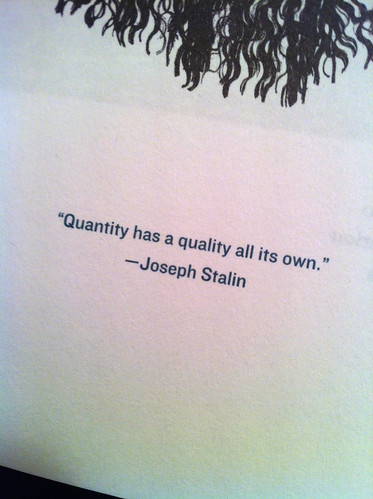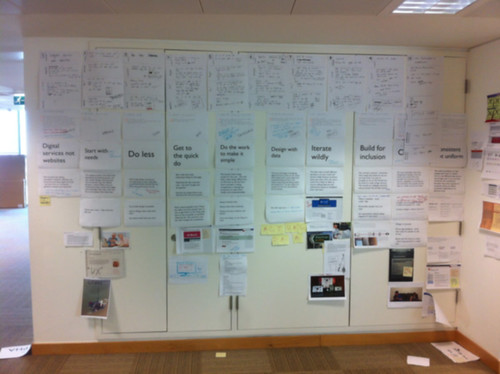Russell Davies
As disappointed as you are
About | Feed | Archive | Findings | This blog by email
« November 2013 | Main | February 2014 »
writing these days
When I left Nike, went freelance, all that while ago, I had an idea that I would 'try more writing'. I knew I'd never make a living at it but I liked the idea of including 'writer' as some of who I was.
By a lot of measures I've not done very well. I've not written another book, the Wired column dried up, I've never done anything else for the radio, I've never written a word of fiction.
At the end of last year I'd pretty much written it off. Never mind, I thought, I'm not a writer. Maybe I'll be a sculptor.
But, looking back now, I've realised I'm doing OK, it's just that 'what a writer is' has moved beyond my sense of Hemmingway in a cafe with pencils and notebooks.
To start with, I still love doing the Campaign column and I need to remember that 460 words a week, for at least five years (maybe more) about an industry that never changes is hard and I've learned loads doing it. That's proper writing even if, now, it feels more like a long, comfortable walk.
And, pleasingly, Wired and The Observer still ask me to do the occasional thing. I love doing these too. It's entirely fact-free, mostly crowd-sourced, entirely speculative and more like Punch than Techcrunch. I like being a slightly sideways voice in tech writing. And I like the place that sort of thing has in a magazine - it's the MacGuffin, the baseboard they use to mount all the stuff people actually want to read, the little pull-outs and things you can buy.
(The latest Wired one was about 'wearables'. Massive hands-up to this (above) though, guilty as charged)
But still and all I can't get past how un-networked these things feel. Solid, embodied slabs of text, changing yet changeless as canal water. It's odd. I learned my writing on this blog, and in teams, writing with others. I much prefer being the writer in a team. And I prefer writing for things that live on the web, in one form or another.
For instance - of everything I've 'written' in the past couple of years - the GDS Design Principles have probably had the most impact. They started as a bit of expedience, a way to postpone design decisions until we'd had chance to make them in the field, but they turned out pretty good. None of the ideas were mine, the whole team baked them from Tom's starter yeast and Mark enforced some proper rigour, but I like to think I spiked up the language enough to make them stick in your head. Principles, a manifesto, bullet points - this is a literary form I'm comfortable with.
Similarly, I wrote the words for this GOV.UK video, they're just the scaffodling for the bits you actually remember, but it's an intereseting task, writing a video about a website. It started off as more like a radio commercial than anything, then talented designers found the right images to make it work as a film. It's not going to win any awards but it does its job.
And I helped Mike write this talk, which summed up a lot of what we've wanted to say about GDS for a while. Again, they're his ideas and, obviously, his delivery, but I made the slides and sometimes, found the right words for the task.
Those three things: the principles, that video, that talk are the most useful and effective bits of writing I've done for years, but until now I've thought of that sort of thing as somehow not 'proper writing'.
Maybe I'm wrong about that.
Maybe what might be interesting now is working out how these kinds of writing might do other kinds of jobs. For instance, what might you write for Wired that works like the Design Principles?
Anyway.
January 10, 2014 | Permalink | TrackBack (0)
think on
"Cybernetics and game theory won them the Cold War, so paying for philosophers is militarily more sensible than paying for an extra company of marines, don’t you think?"
Charles Stross - The Atrocity Archives
January 08, 2014 | Permalink | TrackBack (0)
not a new thing
"The 1851 census also showed that more people in Britain now lived in cities than in the countryside – the first time that this had happened anywhere in the world."
January 07, 2014 | Permalink | TrackBack (0)
stopping the computer eating you
"Top competitors who once relied on particular styles of play are now forced to mix up their strategies, for fear that powerful analysis engines will be used to reveal fatal weaknesses in favoured openings. The result has in some ways made chess more defensive, increasing the risks of daring, adventurous gambits. But in championship matches, where draws are common and the final result is likely to be decided by just a handful of victories, unexpected approaches become even more prized. “Anything unusual that you can produce has quadruple, quintuple the value, precisely because your opponent is likely to do the predictable stuff, which is on a computer,” Anand says."
How to compete with computers maybe.
January 06, 2014 | Permalink | TrackBack (0)
also a good prescription for a blog
"The Outsider ticks all the boxes for a successful cult book: readable style, significant subject-matter, and reckless assertion. The effect was exhilarating."
Also:
"What I, in common with his other enthusiastic readers, took from his work was a conviction and a technique. The conviction was that the everyday world might be — as to adolescents it certainly is — full of boredom and triviality, but the wider world of nature, art, and learning is full of inexhaustible interest. But it’s easy to lose sight of the latter, and let ourselves be trapped in the former. The technique, the trick for lifting oneself from the one world to the other, was simple enough: intense concentration followed by relaxation will lead to elation.
The thing is, it does work."
January 05, 2014 | Permalink | TrackBack (0)
middle earth exploratory land archive
Went to see the British Land Exploratory Archive show a while back. Saw The Desolation of Smaug the other day. There are similarities.
January 03, 2014 | Permalink | TrackBack (0)
new year
January 02, 2014 | Permalink | TrackBack (0)








